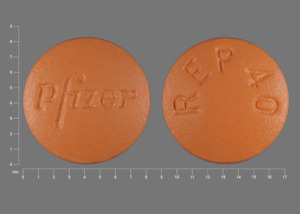Relpax Interactions
There are 245 drugs known to interact with Relpax (eletriptan), along with 3 disease interactions, and 2 alcohol/food interactions. Of the total drug interactions, 98 are major, 142 are moderate, and 5 are minor.
- View all 245 medications that may interact with Relpax
- View Relpax alcohol/food interactions (2)
- View Relpax disease interactions (3)
Most frequently checked interactions
View interaction reports for Relpax (eletriptan) and the medicines listed below.
- Ambien (zolpidem)
- amitriptyline
- baclofen
- clonazepam
- cyclobenzaprine
- Cymbalta (duloxetine)
- Flexeril (cyclobenzaprine)
- gabapentin
- ibuprofen
- levothyroxine
- Lexapro (escitalopram)
- Lyrica (pregabalin)
- magnesium oxide
- melatonin
- omeprazole
- prednisone
- propranolol
- Singulair (montelukast)
- Synthroid (levothyroxine)
- tizanidine
- Topamax (topiramate)
- topiramate
- tramadol
- trazodone
- Vitamin B12 (cyanocobalamin)
- Vitamin D3 (cholecalciferol)
- Xanax (alprazolam)
- Zofran (ondansetron)
- Zoloft (sertraline)
- Zyrtec (cetirizine)
Relpax alcohol/food interactions
There are 2 alcohol/food interactions with Relpax (eletriptan).
Relpax disease interactions
There are 3 disease interactions with Relpax (eletriptan) which include:
More about Relpax (eletriptan)
- Relpax consumer information
- Compare alternatives
- Pricing & coupons
- Reviews (151)
- Drug images
- Side effects
- Dosage information
- During pregnancy
- Generic availability
- Drug class: antimigraine agents
- Breastfeeding
- En español
Related treatment guides
Drug Interaction Classification
| Highly clinically significant. Avoid combinations; the risk of the interaction outweighs the benefit. | |
| Moderately clinically significant. Usually avoid combinations; use it only under special circumstances. | |
| Minimally clinically significant. Minimize risk; assess risk and consider an alternative drug, take steps to circumvent the interaction risk and/or institute a monitoring plan. | |
| No interaction information available. |
Further information
Always consult your healthcare provider to ensure the information displayed on this page applies to your personal circumstances.


